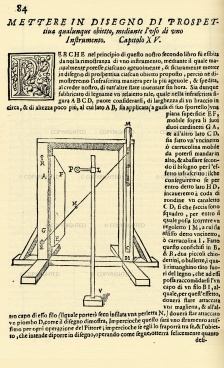Door by Pietro Accolti
From Inventions
m (moved Pietro Accolti's window to Door by Pietro Accolti) |
|||
| (One intermediate revision not shown) | |||
| Line 1: | Line 1: | ||
{{Template invention | {{Template invention | ||
| - | |nome= Has no specific name but is a variant of Albrecht Dürer’s [[window]]. | + | |nome= Has no specific name but is a variant of Albrecht Dürer’s [[Door |window]]. |
|inventore= Pietro Accolti | |inventore= Pietro Accolti | ||
| Line 7: | Line 7: | ||
|data= 1625 | |data= 1625 | ||
| - | |descrizione= Pietro Accolti’s perspective instrument is a variant of Albrecht Durer’s more famous [[window]]. Unlike its model, Accolti’s instrument could be used to depict from real life objects situated at any distance. The visual ray was not, in fact, simulated by a string. The painter looks at a point on the object through a viewer and intersects the visual ray by mans of a ball sliding on a string that runs diagonally across the frame of the “window”. When the ball is stopped at the point sighted, the “window” is closed and the position of the ball is transcribed onto the sheet of drawing paper. A variant of this instrument, with the “window” hinged to the base of the frame, was proposed later by William Halfpenny in 1731. | + | |descrizione= Pietro Accolti’s perspective instrument is a variant of Albrecht Durer’s more famous [[Door |window]]. Unlike its model, Accolti’s instrument could be used to depict from real life objects situated at any distance. The visual ray was not, in fact, simulated by a string. The painter looks at a point on the object through a viewer and intersects the visual ray by mans of a ball sliding on a string that runs diagonally across the frame of the “window”. When the ball is stopped at the point sighted, the “window” is closed and the position of the ball is transcribed onto the sheet of drawing paper. A variant of this instrument, with the “window” hinged to the base of the frame, was proposed later by William Halfpenny in 1731. |
|componenti= | |componenti= | ||
Current revision as of 12:11, 27 July 2010
Has no specific name but is a variant of Albrecht Dürer’s window.
Contents |
Inventor
Pietro Accolti
Historic Period
1625
Description
Pietro Accolti’s perspective instrument is a variant of Albrecht Durer’s more famous window. Unlike its model, Accolti’s instrument could be used to depict from real life objects situated at any distance. The visual ray was not, in fact, simulated by a string. The painter looks at a point on the object through a viewer and intersects the visual ray by mans of a ball sliding on a string that runs diagonally across the frame of the “window”. When the ball is stopped at the point sighted, the “window” is closed and the position of the ball is transcribed onto the sheet of drawing paper. A variant of this instrument, with the “window” hinged to the base of the frame, was proposed later by William Halfpenny in 1731.
Bibliographical Resources
Accolti, Pietro. Lo inganno de gl’occhi: prospettiva ptratica di Pietro Accolti gentilhuomo fiorentino e della Toscana accademia del disegno. Trattato in acconcio della pittura. In Firenze, appresso Pietro Cecconcelli, 1625, pp. 5, 12, 15-16, 21, 24, 25, 28-30, 36, 40-41, 45, 48, 54, 65, 74, 84-87, 89, 116, 122, 124-125, 128, 132, 144.
Halfpenny, William (Michael Hoare). Perspective made easy: or, a New Method for Practical Perspective. Shewing the use of a new invented scenographical protractor; so easy, that a Person, tho’ an intire Stranger to Perspective, may, by Reading a few Lines, become Master of the Instrument, without the help of a Master. It’s Useful in Taking the Perspective Draughts of Towns, Countrys, Houses, and Gardens, or any Object whatever; much easier than what has hitherto been Practised. With several useful Examples in Practical Perspective, London, 1731.
Images
Author of the entry: Filippo Camerota

